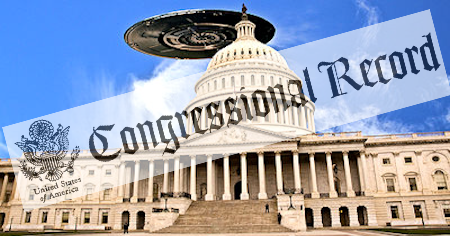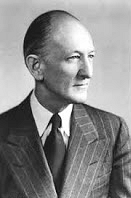| |
Take, for instance, this sample from a NICAP bulletin. "Falls" from UFOs were a thing, as some readers may recall about the dubious 1947 Maury Island case and a 1950's incident in Brazil investigated by Dr. Olavo Fontes.
More material distributed by NICAP in the late 1950's indicates its assessment of a forthcoming "break in official secrecy in 1959." Note the analysis (at the bottom of the image) indicating suspicions UFO bases were located on Mars and Venus. The speculation was due to interpretations of increases in UFO sightings while the planets were closer to Earth.
Further research indicated an ambitious NICAP member wrote Congressman William Ayres, asking if Congress investigates UFOs. Why, yes, Ayres suggested, we're on it, as reported in a 1958 edition of the Akron Beacon Journal (right).
The item made news when NICAP front man Maj. Donald Keyhoe cited the statement during a 1958 talk in DC.
"A constituent made an inquiry and I had it checked into," Congressman Ayres explained further. "As I recall, a subcommittee of the House Armed Services Committee had held hearings," he added, a possible reference to the 1953 Robertson Panel or something similar.
It's more understandable that UFO investigators in the 1950's perceived such events to be greatly significant than it is when they express shock and awe today. The 1950's researchers and reporters didn't have the saturation level of unresolved hype and mountains of material that we, their successors, have available while currently forming our assessments.
Whether or not we use it, and whether or not it is omitted by supposed experts and journalists due to ulterior motives or incompetence, are questions the UFO genre appears destined to struggle with.
"A constituent made an inquiry and I had it checked into," Congressman Ayres explained further. "As I recall, a subcommittee of the House Armed Services Committee had held hearings," he added, a possible reference to the 1953 Robertson Panel or something similar.
It's more understandable that UFO investigators in the 1950's perceived such events to be greatly significant than it is when they express shock and awe today. The 1950's researchers and reporters didn't have the saturation level of unresolved hype and mountains of material that we, their successors, have available while currently forming our assessments.
Whether or not we use it, and whether or not it is omitted by supposed experts and journalists due to ulterior motives or incompetence, are questions the UFO genre appears destined to struggle with.


.jpg)


No comments :
Post a Comment
Dear Reader/Contributor,
Your input is greatly appreciated, and coveted; however, blatant mis-use of this site's bandwidth will not be tolerated (e.g., SPAM, non-related links, etc).
Additionally, healthy debate is invited; however, ad hominem and or vitriolic attacks will not be published, nor will "anonymous" criticisms. Please keep your arguments/comments to the issues and subject matter of this article and present them with civility and proper decorum. -FW